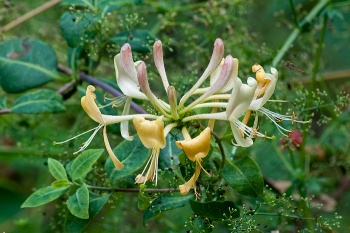Honeysuckle
Other Names: Barbe de Chèvre, Broquebique, Caulis Lonicerae Japonica, Chèvrefeuille, Chèvrefeuille des Bois, Chèvrefeuille des Haies, Chèvrefeuille du Japon, Cranquillier, Fleur de Miel, Flos Lonicerae, Goat's Leaf, Herbe de Chèvre, Herbe à la Pentecôte, Herbe de Pentecôte, Herbe à la Vierge, Honey Suckle, Honeysuckle Flower, Japanese Honeysuckle, Jin Yin Hua, Jinyinhua, Lonicera, Lonicera aureoreticulata, Lonicera bournei, Lonicera caprifolia, Lonicera japonica, Lonicerae Japonicae, Madreselva, Nindo, Périclymène, Ren Dong, Saute-Buisson, Suikazura, Woodbine.
Honeysuckle is a plant that is sometimes called “woodbine.” The flower, seed, and leaves are used for medicine.
Special Precautions of Honeysuckle
- Essential Oil contains myrcene, which is known to cause cancer
- Skin contact with honeysuckle can cause rash in allergic people.
- Pregnancy and breast -feeding: Not enough is known about the use of honeysuckle during pregnancy and breast-feeding. Stay on the safe side and avoid use.
- Surgery: Honeysuckle might slow blood clotting, so there is concern that it might increase the risk of extra bleeding during and after surgery. Stop using honeysuckle at least 2 weeks before a scheduled surgery.
- Medications that slow blood clotting (Anticoagulant / Antiplatelet drugs) interacts with Honeysuckle
The benefits and uses of Honeysuckle are
Similar to its cousin elderberry, honeysuckle is exceptionally antibacterial and antiviral -- so much so that it's deemed the "Echinacea of Chinese Medicine" by Michael Tierra, C.A., N.D., O.M.D. The flowers are used for infections as well as inflammation and have been found to be effective against Salmonella typhi, Pseudomonas aeruginosa, Staphylococcus aureus and Streptococcus pneumoniae. In eastern Asia, honeysuckle is traditionally used to treat dysentery, conjunctivitis and inflammation of the urinary tract and reproductive organs, along with fevers, colds and influenza. Flower extracts are helpful in reducing cholesterol levels, lowering blood pressure and treating tuberculosis. Externally, honeysuckle tea can alleviate rheumatism, sores, tumors, scabies, swelling and boils.
- Swelling (inflammation) of small air passages in the lung (bronchiolitis). Early research suggests a combination of honeysuckle, Baikal skullcap, and forsythia given by IV (intravenously) by a healthcare provider might shorten the length of symptoms of *bronchiolitis in children with respiratory syncytial virus infection.
- Digestive disorders.
- Cancerous tumors.
- Constipation.
- Skin inflammation.
- Arthritis
- Itching.
- Colds.
- Asthma
- Fever.
- Swelling.
- Boils.
- Sores.
- Bacterial or viral infections : a molecule in the honeysuckle plant has the world's first "virological penicillin." The researchers said that for generations,the medicine was used to treat influenza infections in traditional Chinese medicine. In clinical trials the compound MIR2911 was successful in suppressing swine flu, bird flu and other influenza A viruses.
- Heart tonic : Considered an effective tonic for the heart, honeysuckle is used as a remedy for a wide range of cardiac disorders.
- Promoting sweating.
